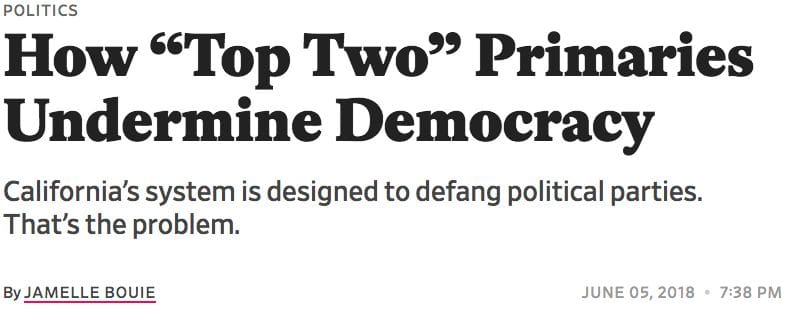Partisan Journalists Struggle with Definition of Democracy

The biggest primary day of 2018 has come and gone. The November ballot is now set in California and 7 other states.
As I looked at the coverage from the week, I noticed an article from Slate writer Jamelle Bouie that makes the case that because the nonpartisan, top-two primary in California doesn't serve the interests of parties, it is undemocratic.
Seriously?
Partisan Nonsense of the Week: Slate’s Jamelle Bouie Says Parties are Building Blocks of Democracy
Here's Slate's headline:

Just consider the irony.
The definition of a democracy is: "a system of government by the whole population or all the eligible members of a state, typically through elected representatives." In other words, people are the building blocks of any democracy.
But Jamelle takes his definition of democracy another route, arguing instead that political parties, suffering from historic disapproval ratings, are the only vehicles by which an individual person should be able to express their political choices.
Even Jamelle recognizes the distinction between Americans, as people, and political parties, as private self-interested corporations: "Americans have always been deeply skeptical of political parties, perpetually seeking to limit their power and influence. More often than not, this backfires."
Yet, the premise of his article is that a voter-nominated primary somehow offends democracy because the private parties aren't in charge:
"The 'top-two' system was pitched as a way to broaden democracy and participation, but in reality it does neither. Because there are no parties choosing nominees, top two is essentially the first stage of the general election—with much lower turnout because of its timing in June."
Forget his implication that top-two is to blame for the drop in voter turnout nationwide. That's for another article.
For now, consider a closed party primary system in a state like New Jersey, where:
- Turnout is almost always less than half of the turnout in California (usually MUCH less);
- Voters have to join a party to vote (First Amendment right of association, anyone?);
- Choice is restricted to the candidates of one party;
- The top-one winner in each primary often gets far less than 50% of the vote;
- Candidates have to prove their "party" credentials, rather than their credentials to represent everyone;
- Electoral districts are drawn to heavily favor one party or the other, so general elections are rarely competitive (i.e. they don't mean anything).
That's more democratic? Wacky thesis Jamelle.
RELATED: Read About The Legal Challenge Against New Jersey's Closed Primaries
ALSO READ: The Real History: California’s Top-Two Nonpartisan Primary Electoral Reform
On the issue of "democracy," there's something else important to point out. The very basis for the top-two primary envisioned by the author, the Independent Voter Project, was a system where every voter is treated the same, regardless of whether or not they decide to join a political party.
So is Jamelle really concerned with democracy, or the future of the Democratic Party?
For context, he seems to be sympathetic to the decline of the Democratic Party's ability to determine the outcome of the election:
"The state is critical in the Democratic fight to win a majority in the House of Representatives. Republicans hold seven districts that Hillary Clinton won in 2016, and flipping them would substantially raise the prospects that Democrats can retake the House," he writes.
Here's the sad truth. Jamelle seems like a smart, well-read, and political savvy journalist. But he sees the world through a partisan lens, unable to witness the political world in the way independent-minded voters do. That's the state of politics. For party leaders, pundits, and partisan journalists, the argument over top-two is about strengthening the democratic process so THEIR party wins. After all, don't we all think we know what is best for democracy?
Point is, democracy is about equal rights for everyone, including the people you don't agree with -- and those who refuse to join YOUR party.
And this brings me to the final paragraph in Jamelle's article:
"Political parties are not above critique and reform. But effective change begins with reality: As long as we have democracy, we will have parties and they will continue to do the vital work of mobilizing voters, organizing elections, and running government. The question, for those who value democracy, is how to make them—and the institutions of American government at large—more fair, more responsive, and more accountable to the needs of the public."
The irony, of course, is that while he rails against nonpartisan election reform, he is making the case for nonpartisan election reform. There is no other way to make parties or government institutions fairer, more responsive, and more accountable than to take the reins of elections away from the parties and give it to voters.
Photo Credit: Joseph Sohm / shutterstock.com





